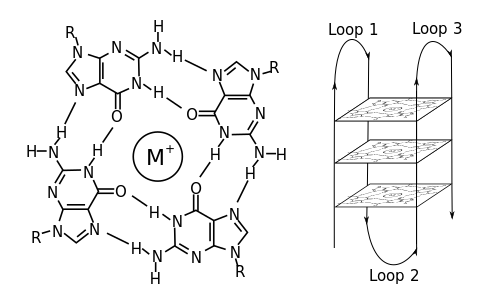In molecular biology, a guanine tetrad (also known as a G-tetrad or G-quartet) is a structure composed of four guanine bases in a square planar array. [1] [2] They most prominently contribute to the structure of G-quadruplexes, where their hydrogen bonding stabilizes the structure. [3] [4] Usually, there are at least two guanine tetrads in a G-quadruplex, and they often feature Hoogsteen-style hydrogen bonding. [1]
Guanine tetrads are formed by sequences rich in guanine, such as GGGGC. [5] They may also play a role in the dimerization of non-endogenous RNAs to facilitate the replication of some viruses. [5] Guanine tetrads dimerize through their 5' ends since it is more energetically favorable. [6]
They can be stabilized by central cations, such as lithium, sodium, potassium, rubidium, or caesium. [7] [8] However, they still form a variety of different structures. [1] Guanine tetrads are not always stable, but the sugar-phosphate backbone of DNA can assist in stability of the guanine tetrads themselves. [1] Guanine tetrads are more stable when stacked, as intermolecular forces between each layers help stabilize them. [9]
Guanine tetrads can also influence recombination, replication, and transcription. [1] [2] For instance, guanine tetrads are found in the promoter region of the Myc family of oncogenes. [10] They also function in immunoglobulin class switching and may play a role in the genome of HIV. [11] Guanine tetrads appear frequently in the telomeric regions of DNA. [3]
See also
References
- ^ a b c d e Kogut, Mateusz; Kleist, Cyprian; Czub, Jacek (2016-04-20). "Molecular dynamics simulations reveal the balance of forces governing the formation of a guanine tetrad-a common structural unit of G-quadruplex DNA". Nucleic Acids Research. 44 (7): 3020–3030. doi: 10.1093/nar/gkw160. ISSN 1362-4962. PMC 4838382. PMID 26980278.
- ^ a b Walsh, K.; Gualberto, A. (1992-07-05). "MyoD binds to the guanine tetrad nucleic acid structure". The Journal of Biological Chemistry. 267 (19): 13714–13718. doi: 10.1016/S0021-9258(18)42272-7. ISSN 0021-9258. PMID 1320026.
- ^ a b Sundquist, Wesley; Klug, Aaron (1989). "Telomeric DNA dimerizes by formation of guanine tetrads between hairpin loops". Nature. 342 (6251): 825–829. Bibcode: 1989Natur.342..825S. doi: 10.1038/342825a0. PMID 2601741. S2CID 4357161.
- ^ Meyer, Michael; Brandl, Maria; Sühnel, Jürgen (2001-09-01). "Are Guanine Tetrads Stabilized by Bifurcated Hydrogen Bonds?". The Journal of Physical Chemistry A. 105 (35): 8223–8225. Bibcode: 2001JPCA..105.8223M. doi: 10.1021/jp011179i. ISSN 1089-5639.
- ^ a b Yu, H.; Li, T.; Qiao, W.; Chen, Q.; Geng, Y. (2007). "Guanine tetrad and palindromic sequence play critical roles in the RNA dimerization of bovine foamy virus". Archives of Virology. 152 (12): 2159–2167. doi: 10.1007/s00705-007-1047-5. ISSN 0304-8608. PMID 17712597. S2CID 19794444.
- ^ Kogut, Mateusz; Kleist, Cyprian; Czub, Jacek (2019-09-20). "Why do G-quadruplexes dimerize through the 5'-ends? Driving forces for G4 DNA dimerization examined in atomic detail". PLOS Computational Biology. 15 (9): e1007383. Bibcode: 2019PLSCB..15E7383K. doi: 10.1371/journal.pcbi.1007383. ISSN 1553-734X. PMC 6774569. PMID 31539370.
- ^ Azargun, Mohammad; Fridgen, Travis D. (2015-09-30). "Guanine tetrads: an IRMPD spectroscopy, energy resolved SORI-CID, and computational study of M(9-ethylguanine)4+ (M = Li, Na, K, Rb, Cs) in the gas phase". Physical Chemistry Chemical Physics. 17 (39): 25778–25785. Bibcode: 2015PCCP...1725778A. doi: 10.1039/C5CP00580A. ISSN 1463-9084. PMID 25845669.
- ^ Fancui, Meng; Weiren, Xu; Chengbu, Liu (May 2004). "Theoretical study of incorporating 6-thioguanine into a guanine tetrad and their influence on the metal ion guanine tetrad". Chemical Physics Letters. 389 (4): 421–426. Bibcode: 2004CPL...389..421M. doi: 10.1016/j.cplett.2004.03.128.
- ^ Cj, Lech; B, Heddi; At, Phan (2013-02-01). "Guanine Base Stacking in G-quadruplex Nucleic Acids". Nucleic Acids Research. 41 (3): 2034–46. doi: 10.1093/nar/gks1110. PMC 3561957. PMID 23268444.
- ^ Phan, Anh Tuân; Kuryavyi, Vitaly; Gaw, Hai Yan; Patel, Dinshaw J. (Aug 2005). "Small-molecule interaction with a five-guanine-tract G-quadruplex structure from the human MYC promoter". Nature Chemical Biology. 1 (3): 167–173. doi: 10.1038/nchembio723. ISSN 1552-4469. PMC 4690526. PMID 16408022.
- ^ Laughlan, Gerard; Murchie, Alastair; Norman, David (22 Jul 1994). "The High-Resolution Crystal Structure of a Parallel-Stranded Guanine Tetraplex" (PDF). American Association for the Advancement of Science. 265 (5171): 520–524. Bibcode: 1994Sci...265..520L. doi: 10.1126/science.8036494. JSTOR 2884414. PMID 8036494.
